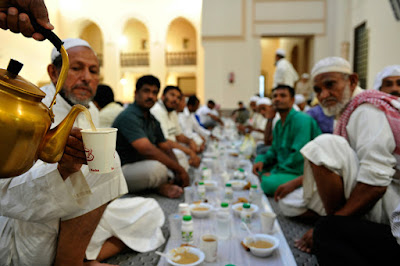In Ramadan, the holy month for Islamic civilization, it is an obligation for Muslim to do fasting. However, fasting is a must for every Muslim if they are healthy both psychologically and physically. It is clearly written in the holy Koran that every Muslim must do fasting, but if it causes excessive difficulty they are not allowed to do fasting. Nevertheless, the prohibition is not considered because of certain circumstances, do we need still do fasting?
The purpose of fasting in Ramadan in Islamic teaching comprises two aspects of life which are obeying the God and understanding the humanity itself. Interestingly, the obligation is particularly instructed for improving the sense of belonging as a human. Because of understanding the situation occurred to us, Ramadan is also called as a blessing month. The objectives are to understand self-constrain, self-awareness of God existence and increasing the sympathy and empathy to people who live in poverty because during Ramadan every Muslim try to experience the same situations to them which are hungry and sick.
 |
| Fasting in Ramadhan Could Affect Diabetes Mellitus Type 1 (Image is downloaded from http://healthyeatingharbor.com) |
Fasting for People Who Have Diabetes
For people who are infected by diabetes type 1, controlling the time of eating is important. But, based on the research conducted by Asma Deeb et al., suggested that there are influences among attitude, complications, the ability of fasting and the glycemic control in fasting for children and adolescents who have diabetes record. They suggested if the expectations of doing fasting in Ramadan for diabetes patients were overcome, so it is better not to do fasting since it majorly affects the glucose which can cause complications. It means that fasting has shown little evidence in influencing the changing of Hb1Ac and in contrast it is because of the behavior during Ramadan.
This study surveyed 65 diabetes patients in Diabetes Center at Mafraq Hospital by questionnaire in 2015. The researchers took surveys in two times which are two to four weeks before Ramadan and two to 2-4 after Ramadan. By questioning the highlights of symptoms of hypoglycemia and hyperglycemia, they strongly suggested that the main changing of glucose within the blood mainly caused by habitual activity of elevated food and beverage consumptions between Suhoor and Iftar – break the fasting in dusk; the tradition of food consuming towards the end of Ramadan or celebrating the Eid Mubarak.
Psychologically speaking, the tradition of celebrating Ramadan and Eid Mubarak has led many Muslim to neglect their healthy condition. The Koran itself has stated clearly that it is prohibited for people who have sick in particular for individual who has diabetes to do fasting. Moreover, one of the main objectives in doing fasting in Ramadan is to experience hungry and sick occurred within poor people. Technically speaking, every Muslim people are intended to experience in preventing their desire either if their body is healthy or sick.
Conclusion for Conducting Fasting on People Who Have Diabetes
However, if they insist doing fasting, controlling and monitoring the glycemic is obligatory due to the high risk. Furthermore, if the level of glucose can cause the hyperglycemia and hypoglycemia they must break the fast as soon as possible although the breaking time is closing to Dawn which indicates the end of fasting. Based on this study also, the tradition in celebrating the Ramadan and Eid Mubarak is essential since the cuisine which is prepared will be consumed, and it must be monitoring thoroughly.
Reference
The Holy Koran. Sura 2: Verses 183-5
Attitude, complications, ability of fasting and glycemic control in fasting Ramadan by children and adolescents with type 1 diabetes mellitus authorized by Asma Deeb, Nabras Al Qahtani, Mariette Akle, Himanshi Singh, Rifah Assadi, Salima Attia, Hana Al Suwaidi, Tara Hussain, Nico Naglekerke. Diabetes Research and Clinical Practice. International Diabetes Federation.
http://dx.doi.org/10.1016/j.diabres.2017.01.015